La Cornue Château vs. La Cornue CornuFé vs. Lacanche French Ranges: Which Is Best?
September 13th, 2024 | 16 min. read
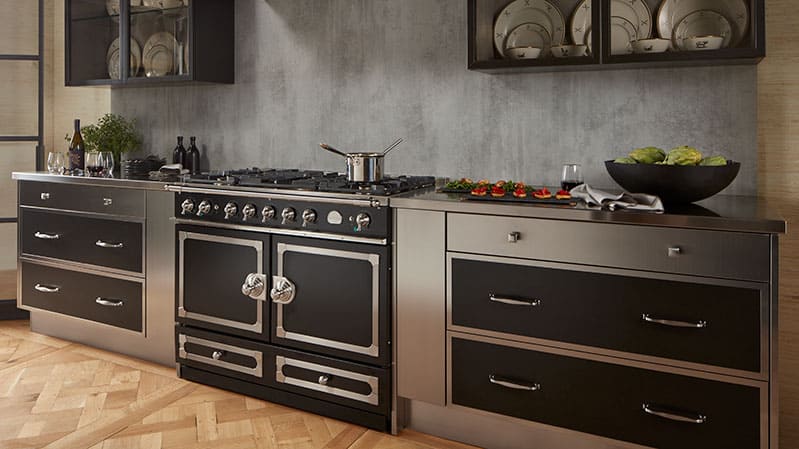
After years of sticking with similar-looking, similarly functioning pro ranges, you're now faced with a flood of options for French, mostly French, and English-style ranges.
But let’s be honest—sifting through all these choices can be overwhelming. Even after nearly 40 years in the appliance business, I still find it confusing.
Maybe you’re eyeing a La Cornue, Lacanche, or CornuFé range to match your cooking style or give your kitchen that extra wow factor.
Here’s what you need to know as you dive into this (admittedly long but definitely entertaining) article:
- These ranges have very little in common.
- Before buying one, you should understand how you use the range and your cooking style.
I’ll walk you through the key differences, top features, and a few quirks of each, along with how to go about choosing the right one.
Plus, I’ll share what some lifestyle bloggers have to say—one’s a CornuFé fan, while another swears by her Lacanche.
This article is the longest I've ever written, but by the end, you’ll have a solid idea of which range (if any) deserves a place in your kitchen.
You'll know whether a European range is your next cooking partner—or if it’s time to keep searching.
Let's get started.
Table of Contents
Table of Contents
Who Is La Cornue and Lacanche?
La Cornue
La Cornue is a French range dating back to 1908.
They pioneered the first convection oven. Their founder followed the new gas lines in Paris at that time.
Before then, people cooked their meals over a flame—like camping every day.
Recently, La Cornue was bought by the Middleby Corporation in Illinois as part of their residential luxury brand portfolio.
The Middleby Corporation also owns Viking.
However, Middleby has left La Cornue alone, preserving its heritage while adding some capital.
La Cornue is still manufactured in Saint-Ouen-l'Aumône, France.
La Cornue CornuFé
The CornuFé is a French-inspired range, but it’s actually manufactured in England.
It’s only available in two sizes with limited customization.
The CornuFé comes in standard colors and two trims but can now be ordered custom in 56 colors.
Lacanche
Lacanche dates back to the 18th century.
Lacanche started as an ironworks company and remained under the same family ownership for almost 200 years.
Like La Cornue, they were eventually bought by a conglomerate.
But about ten years later, the company stopped manufacturing ranges and idled the plant.
However, a former worker stepped in, saved the site, and resurrected the Lacanche stove in the heart of Burgundy, France.
Now, let’s look at how to order and customize each range.
La Cornue French Ranges
Ordering a La Cornue Range
Nowadays, La Cornue is known for incorporating the best materials into its ranges.
For example, La Cornue sources its metal from Finland for its strength.
Strange yet interesting fact: Finnish metal is the strongest metal on the market.
Each unit is individually hand-made and customized to your requests and specifications.
You are assigned a project manager for your Château range, and you must sign mandatory paperwork to ensure the right range is ordered.
We also have paperwork to sign on our end.
This detailed process is only offered by La Cornue, guaranteeing the dealer delivers the correct range to your home.
It’s pretty amazing, considering the Château has 8,000 different configurations—in size, colors, configuration, and trims.
La Cornue Manufacturing
Sixty master craftspeople build nearly every range component. La Cornue has spent generations building and refining their ranges.
Recently, La Cornue started using machinery to aid in the manufacturing process.
One of their master artisans discusses what it’s like to manufacture a La Cornue stove on their YouTube channel.
You get a real sense of his passion for creating cooking ranges. It’s impressive as he talks about his art and craft.
It’s unusual in a world of automated mass manufacturing.
La Cornue Château Series Ranges
La Cornue is a completely different range. It allows you to customize colors, trims, and even the stovetop configuration.
It’s the finest range you can buy—but only for some.
In the video below, you’ll learn about La Cornue’s Château Series range, its best features, and a few drawbacks to consider.
Best Features of La Cornue Château Ranges
Ability to Customize
You’ll learn more about color later, but you can design almost anything with La Cornue.
An unnamed F1 race car driver requested his range be finished in resin, and La Cornue made it happen.
Colors are bold in La Cornue, but you can personalize this range in your finish of choice.
La Cornue Château Range Colors
Many companies like Viking, BlueStar, Capital, and Bertazzoni offer cheaper ranges with colors.
However, La Cornue executes color better than any other brand.
You can choose from 56 colors and eight trims. A La Cornue range is not just an appliance—it’s an heirloom and the focal point of your kitchen.
You can also request custom colors. Some clients have even sent in paint samples for a personalized look.
.jpg?width=800&height=451&name=La-Cornue-Chateau-Colors-yale-appliance-(1).jpg)
Oven Design
.jpg?width=799&height=449&name=la-cornue-gas-oven-open%20(1).jpg)
Most upscale ovens use convection, but La Cornue is unique.
The air flows from the bottom of the oven, not from a fan at the back.
La Cornue’s patented concave arched top creates a natural convection effect, ensuring even cooking without drying your food.
The larger models (47.5" and up) feature a gas oven, providing moist heat for roasting and broiling, and an electric oven, which is better for baking with its drier heat.
You can also opt for both electric and gas ovens, depending on your preference.
For smaller sizes (35.4" or less), you can choose between electric or gas.
La Cornue Château Range Cooking Modes
I had our former chef describe how you would use each cooking mode. If you love to cook, read on:
- Conventional Heat Mode: This mode operates like traditional (thermal) ovens without convection. It’s ideal for finishing dishes like pastries or cakes by crisping the bottom. You can also use it to make pizzas.
- Floor Vault Combination Function: The Floor Vault Combination uses top and bottom heat.In this mode, food browns faster in the top part of the oven. It also provides a temperature variance, hotter at the top and cooler as you go lower, making it great for delicate pastries, cakes, or soufflés.
- Forced Air Convection Mode: The Forced Air Convection Mode, also known as True European Convection, uses a fan and heating element without top or bottom heat. It’s perfect for multi-rack cooking, like baking three trays of cookies at once.
- Convection-Assisted Oven Mode: This mode uses heat from all three sources: top heat, bottom heat, and the convection fan, along with a third heating element. It’s fast and powerful, making it ideal for large items like roasts. Just be sure to adjust time and temperature accordingly.
- Defrosting Mode: Defrosting Mode circulates cold air through the oven cavity, which is perfect for thawing smaller cuts of meat, like fish fillets or chicken. It can also be used for defrosting desserts and frozen cakes, though it’s not suited for larger cuts of meat.
- Broiling Function: The Broiling Function uses direct, intense heat from the top of the oven. It’s a great finishing mode for melting cheese or browning the tops of casseroles and lasagnas.
- Convection Broiling Mode: This mode combines direct heat from the top of the oven with the convection fan to circulate the heat. It creates a gentler broiling effect, making it ideal for thicker or denser cuts of meat like steaks or whole fish.
Rangetop Configuration
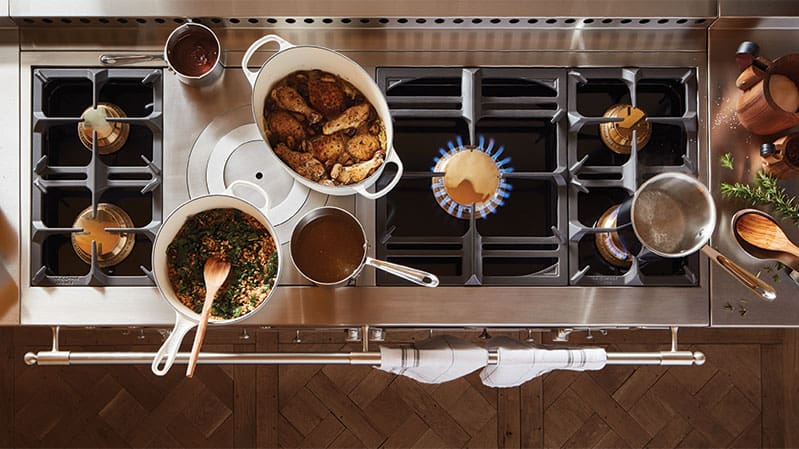
Unlike every other manufacturer, the rangetop is fully customizable with every type of burner, from electric to gas to pro-gas to a French top.
- Gas Burners: One 17,000 BTU (British Thermal Unit) and one 7,500 BTU. The burners are sealed and brass, not stainless, for more evenly distributed heat.
- Lava-Rock Grill: The Lava-Rock Grill has a linear 14,500 BTU gas burner running front to back, set beneath a bed of natural lava rocks to disperse the flame more evenly.
- Power Burner: The Power Burner at 22,000 BTU is great for sautéing, stir-frying, and wok cooking.
- French Top: AFrench top is a gas burner beneath a solid cast iron top that radiates heat outward, allowing you to cook multiple items at different temperatures.
- Induction Burners: Induction is the fastest to heat but has the lowest simmer due to its infinite control.
- Teppanyaki: The La Cornue Teppanyaki allows cooking throughout the surface. The Teppanyaki accessory has a chromium coating for easy cleanup.
.jpg?width=800&height=605&name=La-Cornue-Chateau-Individual-Stovetop-Components-(1).jpg)
La Cornue Château Sizes and Prices
When we teach design classes, we always discuss how appliances fit in standard openings. This is true for every brand—except for La Cornue.
The dimensions are similar, but not the same as American cabinet specifications for ranges, which are 20, 24, 30, 36, 48, and 60 inches wide.
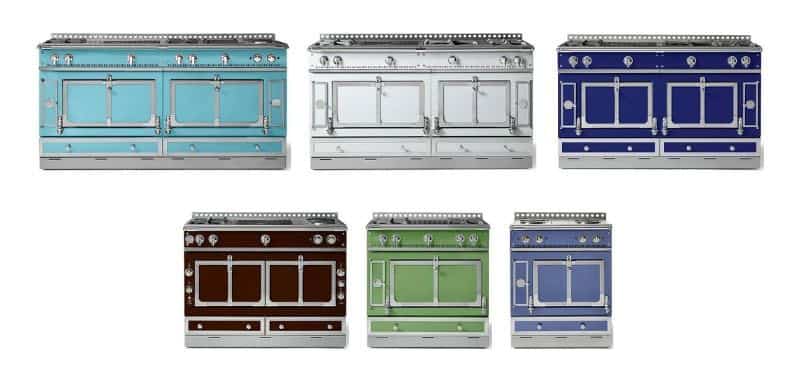
- Grand Palais 180: 70 inches, starting from $60,300
- Le Château 165: 65 inches, starting from $56,000
- Le Château 150: 59.1 inches, starting from $52,300
- Le Château 120: 47.2 inches, starting from $49,275
- Le Château 90: 35.4 inches, starting from $34,700
- Le Château 75: 29.5 inches, starting from $27,500
Read More: Should You Buy a La Cornue Château Professional Range?
La Cornue CornuFé Ranges
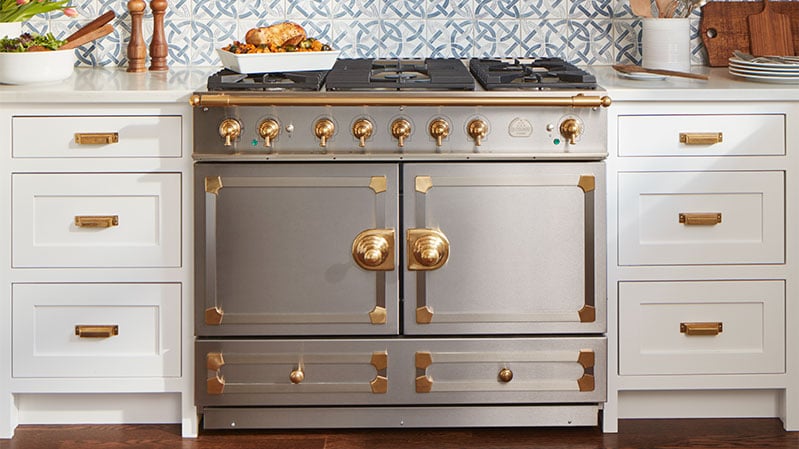 La Cornue CornuFé Ranges
La Cornue CornuFé Ranges
The CornuFé is another unique range.
The CornuFé has fewer options and sizes than the larger Château. You still have colors and a unique look for far less money.
First, it is built in more of a factory rather than the artisanal "workshop" of the Château and Lacanche.
The CornuFé is French engineered but manufactured in England in an AGA factory.
The Château is manufactured in France.
La Cornue CornuFé Color Customizations, Sizes, and Prices
The CornuFé offers eight standard colors and your choice of three trims. However, you can now customize the CornuFé in the Château colors as a special order.
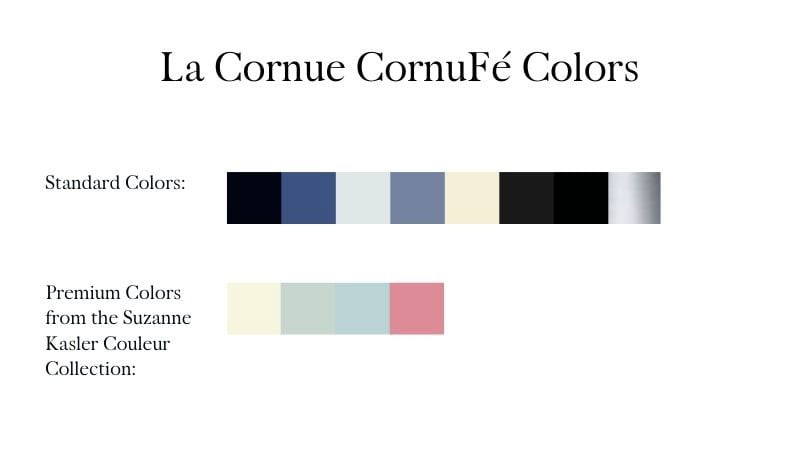
There are only two sizes: 35.4" and 43".
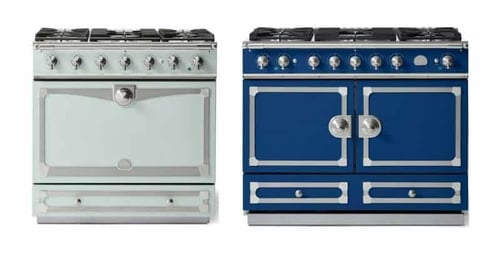
The CornuFé 90 Albertine is 35.4 inches wide and starts at $8,475 in dual fuel and $9,500 in induction, compared to $34,000 plus for the similar-sized Château.
The CornuFé 110 is 43 inches and costs $10,450 in dual fuel and $11,700 in induction.
The Château offers only 36- and 47-inch ranges priced between $34,000 and $47,000.
Both ranges have the same top: five gas burners with a 17,000 BTU max burner or a five-zone induction top.
The 43-inch model is a double oven, while the 35.4-inch is a single oven. Forty-three inches is an unusual dimension, especially in the US.
However, it’s the most popular single range.
People customize their kitchen around the range. You would either buy custom cabinets or place the range by itself.
Internal Dimensions
I measured with tape from the bottom rack to the broiler. The fan measured the depth, which is a true measure of usable capacity.
- CornuFé 90 Albertine: 30" wide x 14” high x 14” deep
- CornuFé 110: 17” wide x 12” high x 14” deep
Both models have storage drawers at the bottom of the range.
CornuFé Oven and Cooking Modes
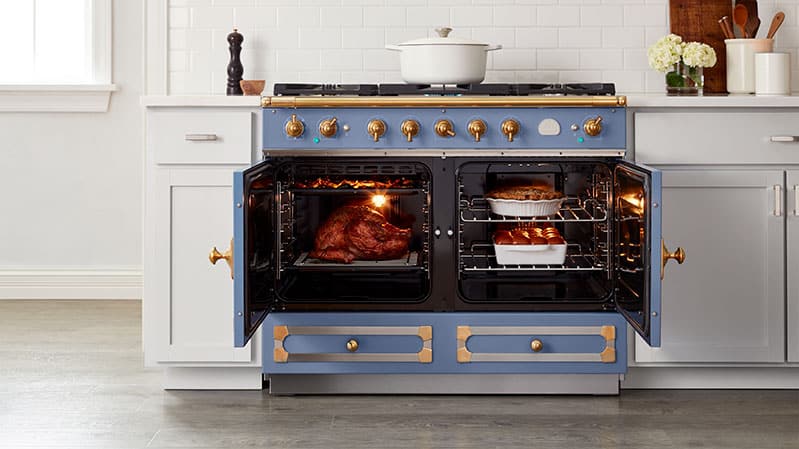
Both ovens are electric convection with seven different cooking modes designed for any type of cooking.
The seven cooking modes are Thaw and Serve, Convection, Convection Broiling, Convection Assist, Conventional, Browning, and Warming.
The following describes each cooking mode and how you would use it:
- Thaw and Serve: Thaw and Serve mode circulates cold air into the oven to speed up defrosting. It's ideal for defrosting desserts, cakes, and smaller cuts of meat and poultry. Avoid defrosting your food with heat because it induces bacteria growth.
- Convection: Convection mode uses fan-forced heat for even baking and multi-rack cooking. La Cornue uses pure convection with the heating element behind the fan. When converting a recipe to convection, always use the 25/25 rule: set convection at 25 fewer degrees for 25% less cooking time.
- Convection Broil: Convection Broil utilizes the fan and the broiling element, which is great for denser meats and larger cuts of fish. It distributes heat better and caramelizes your food without the intense heat. Using any broiling mode, use a grill pan to eliminate flare-ups and place your food on the bottom rack.
- Convection Assist: Convection Assist uses top and bottom heat with a fan disbursing it. This mode does not have true convection, as the element is not behind the fan. It's a great cycle for longer cooking times because it does not dry out the food.
- Conventional Oven: Conventional is a traditional thermal oven without a fan. It's perfect for bread and other foods that need to rise, like soufflés.
- Browning: Browning mode is less intense than broiling and is perfect for melting cheese or toasting coconut flakes or nuts.
- Warming: Warming mode keeps food at a lower temperature by activating only the lower element. Want to crisp the bottom of a pizza? Try the warming mode.
CornuFé Range Accessories
There are three main accessories:
La Cornue CornuFé French Top Accessory
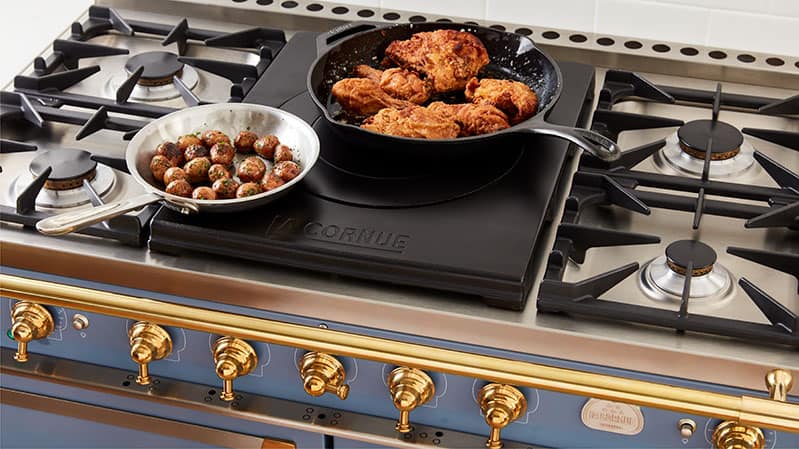
The French Plaque, or French Top, spreads heat out, allowing you to cook different items at different temperatures.
It provides a large, flat surface for indirect heat – perfect for simmering and slow cooking.
The cast aluminum accessory holds up to five pots and radiates heat from the center, creating multiple heat zones.
You are likely familiar with a grill, which produces consistent heat, the opposite of the diffused heat of a French Plaque.
La Cornue CornuFé Griddle Accessory
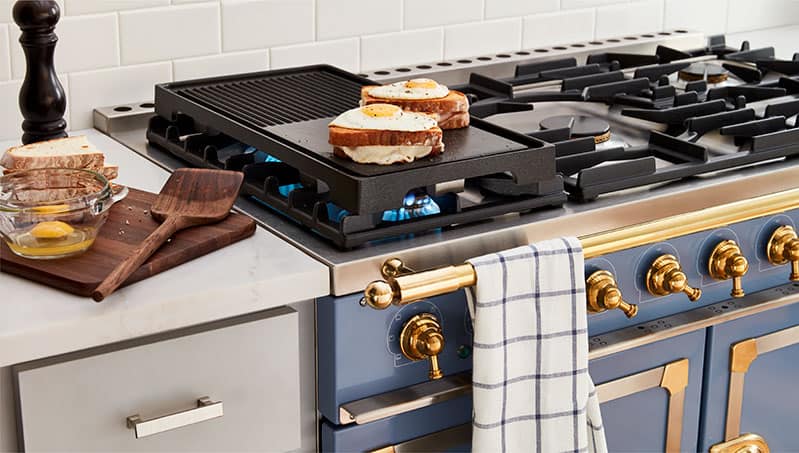
The reversible grill and griddle accessory is made of coated cast aluminum and features a half grill and half griddle.
It’s perfect for quick indoor grilling and fits snugly over the two left burners of the CornuFé 110 and 90 Albertine dual fuel ranges.
The Château has several griddle and French top options.
La Cornue CornuFé Wok Accessory
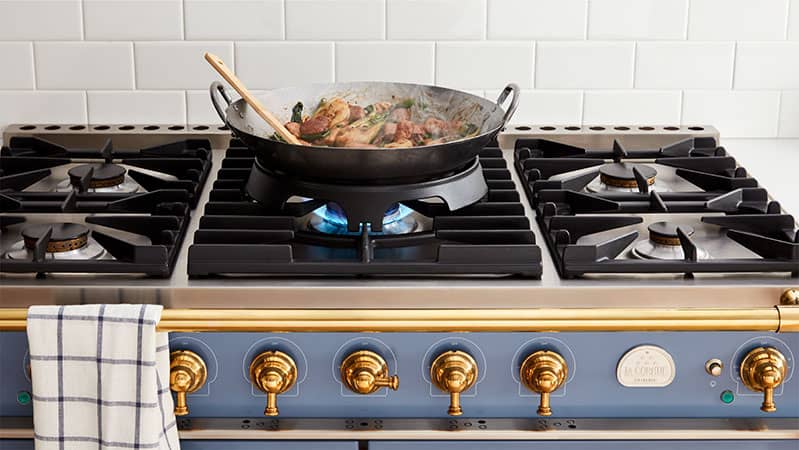
You also have a Wok ring accessory for holding a wok.
Read More: What's the Difference Between the La Cornue Château and the CornuFé Series Ranges?
Lacanche Ranges
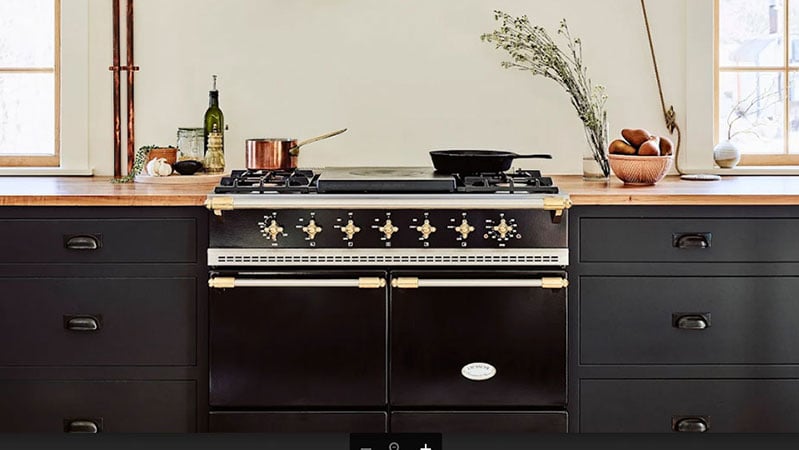 Lacanche Range Classique Line
Lacanche Range Classique Line
Ordering a Lacanche
Lacanche is like a mix between the Château and the CornuFé, offering more colors than the CornuFé and some stovetop customization.
However, the ovens are different from both the Château and CornuFé.
You have fewer modes but more choices of specialized warming, vertical convection, and broiling ovens.
Lacanche Series Ranges
Styles
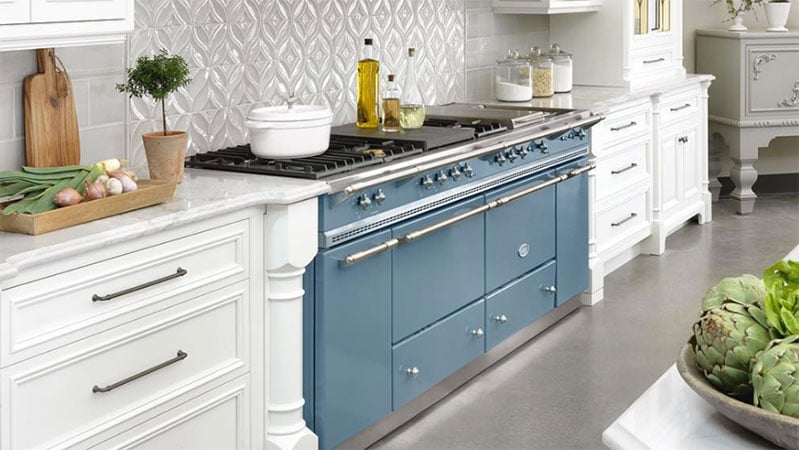 Sully 2200 Range by Lacanche
Sully 2200 Range by Lacanche
You have two lines: the more traditional Classique and the sleek Moderne lines.
In this 86-inch range, you choose whether you want a warming cupboard, gas oven, or electric oven without a broiler, while the storage cupboard is standard.
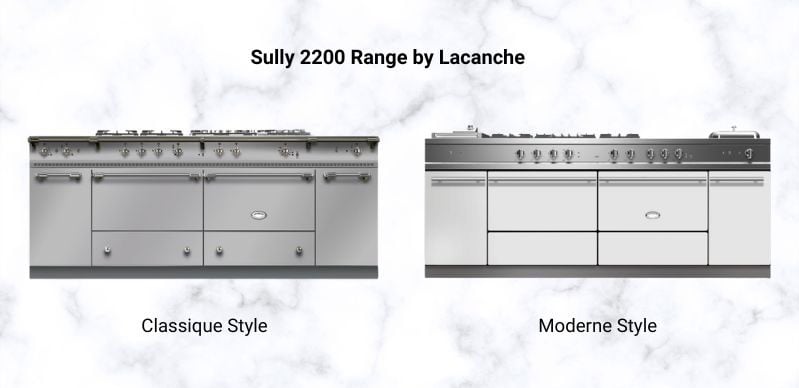
On top of that, you have three choices for customizing your stovetop.
The range comes standard with two 15,000 BTU burners, two 11,000 BTU burners, one 15,000 BTU burner, and one 5,000 BTU burner.
Then you have the following choices for the stovetop:
- Simmer Plate: Cast iron simmer plate over an 18,000 BTU burner
- 18,000 BTU burner
- Two 11,000 BTU burners
- Two 15,000 BTU burners
- Electric "Pancha" griddle
- Gas grill
- Multicooker (cool, steam immersion)
- Induction
Then, choose from 31 colors and four trim styles for the Classique or the Moderne.
That’s how you order a Lacanche: style, size, oven features, and then color and trim.
Sizes
Up to 5 Burner Ranges

- 29 9/16" Cormatin or the Rully: The difference is that the Rully has a separate gas broiler on top.
- 35 7/16" Beune or Bussy: At 36 inches, it adds a separate electric oven, either right or left. You can choose between electric or gas ovens.
- 39 1/2" Cluny and Chagney: The difference between these two models is the Petite broiler with the electric oven or two ovens without broilers.
- 39 ½" Volna and Vougeot: Both ranges offer an oven and a warmer. Low temperatures are great for proofing and dehydrating. You have two choices for the cooktop: burners or a French top with burners.
- 43 1/2" Chambertin or Chassagne: At 43 inches, you can customize the top with one option. You can choose a larger oven and the vertical warmer, whether left or right.
- 43 1/2" Savigney and Saulieu: That side oven is convection instead of a warmer.
Up to 8 Burner Ranges
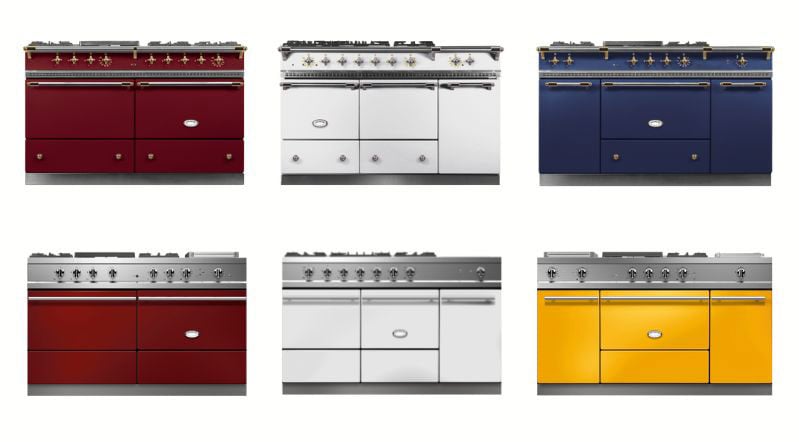
- 55 9/16ths Sully: You can choose two larger ovens and one customizable burner.
- Clunny 1400: You have two smaller ovens and the vertical low-temperature oven.
- Chagney 1400: It's like the Cluny but adds the broiler.
- 59 ½ Fonteney: You can choose the larger oven with two vertical warming cupboards.
- 59 1/2 Citeaux: It's like the Fonteney, with an electric convection side oven instead of the warmer.
9+ Burner Ranges
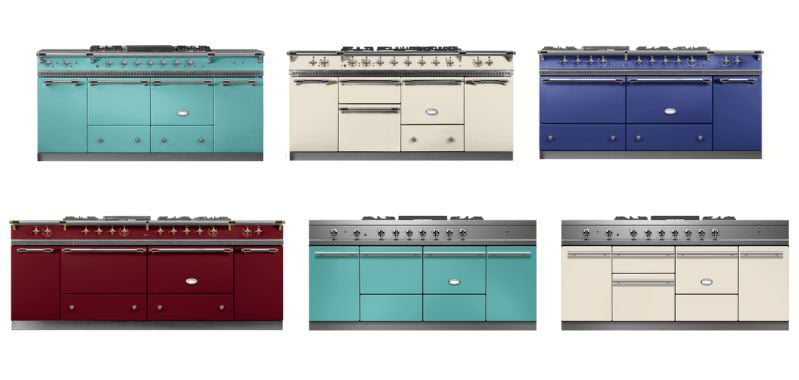
- 71 1/16th Cluny 1800: At this size, you have two ovens and two vertical warming cupboards. You have two rangetop options as well.
- Chagny 1800: The Chagny adds the broiler as well.
- Sully 1800: You have two extra-large ovens and a warming cupboard.
By the way, all these prices are for the base colors and features. Shipping is an additional cost.
Dimensions
- Smaller Cluny-sized ovens: 16"w x 12"h x 18"d
- Larger Sully-sized ovens: 21"w x 12"h x 18"d (16"d if you opt for an electric/convection oven)
- Vertical Convection ovens (Beaune & Bussy): 12 ¾"w x 17 ⅝"h x 16 ⅛"d
- Vertical Convection ovens (Citeaux, Saulieu, Savigny): 12 ¾"w x 17 ⅝"h x 16 ⅛"d
- Warming Cupboards: 13"w x 20"h x 21"d
- Petite Broiler Oven (Chagny models): 16"w x 6"h x 17"d
- Grande Broiler Oven (Rully): 21"w x 6"h x 18"d
What La Cornue and Lacanche Ranges Are Not
French ranges are personalized and beautiful cooking products.
However, they need to be more technical and have some of the updated conveniences of other brands.
They don't have a clock and timer, although many professional ranges, like BlueStar, Wolf all gas, and Thermador Harmony, do.
They do not have steam like Miele in their steam assists ovens or Thermador with their full steam oven in their larger 48- and 60-inch ovens.
Neither range is Wi-Fi enabled and cannot be controlled by a phone app with recipe tie-ins like Miele, Thermador, and Wolf.
La Cornue Château vs. La Cornue CornuFé vs. Lacanche French Ranges
Sizes
The Château has six sizes from 29.5 to 71 inches, whereas the CornuFé has two at 35.4 and 43 inches.
Lacanche has seven sizes, from 27 9/16" to 86 13/16".
Composition
La Cornue is built to a higher standard using Finnish metal versus regular stainless for the other two (I didn't know Finland had the best metal).
However, the difference is noticeable when looking at the range and opening the door.
The La Cornue Château ranges are also equipped with solid brass burners, which are more durable than brass and metal for the other two.
It's manufactured to a higher standard than any other appliance. However, you should expect a much better range at $36,000 and up for a 36-inch range.
Both La Cornue and Lacanche refined their process with wet enamel and a dipping process to maximize the depth of color.
Most La Cornue ranges are still built by hand, while the CornuFé is built in a factory. Lacanche is a combination of both.
Colors
The La Cornue Château has 56 colors and eight trim packages. You can also customize the Château with any custom color.
Lacanche has 31 colors with four trim styles. You also have the Classique or Moderne lines.
The La Cornue CornuFé ranges offer 12 colors and three decorative trims.
La Cornue vs. Lacanche French Range Stovetops
La Cornue Château
You have six choices on the La Cornue.
You can buy almost any combination from all induction, Teppanyaki (griddle), French top, burners, and power burners rated at 22,000 BTU.
The CornuFé uses a fan-driven electric convection oven. Fans can dry the food a bit more than a natural convection oven.
Château has a patented vaulted oven that circulates the air without fans.
CornuFé
You have two rangetops, all gas with the center 17,000 BTU burner or all induction. The French Plaque covers the power burner.
French tops allow you to cook many items simultaneously because the heat starts in the middle and radiates outward.
You also leave the food in the pots, working like a reverse griddle.
If you want to learn more, click here for the blog article about French tops.
Lacanche
On the smaller models, up to 36 inches, there are only six burners, with the power burner at 15,000 BTU.
The open burner ranges lack a true simmer, so you must use a simmer plate.
At 39 inches, you have two choices of power burner of 18,000 BTU or French Plaque.
At 43 inches, you have one choice, along with the standard burners. Then you have two of the larger sizes.
Midsize La Cornue vs. Lacanche Ranges

Château
The Château is either electric or gas.
The oven is concave with the air emanating from the bottom for natural convection.
Fans can dry out the food, especially in the back. (They did on my Kenmore Elite during my rental last year.)
Natural convection provides a steady flow of air at an even temperature. Beneath is a storage drawer.
Interestingly, you have an electric broiler with gas or electric ranges.
Oven Dimensions
- Gas: 22.6” W x 19.8” D x 11.8” H with a 3.1 cubic foot oven
- Electric: 22.6” W x 19.8” D x 11.8” H with a 3.1 cubic foot oven
CornuFé
CornuFé, despite being French-inspired but built in an English factory, is American electric convection only.
It is Americanized compared to the Château’s more traditional French design.
Oven Dimensions:
- 28.1” W x 15.3” D x 15” H
Lacanche
At 36 inches, Lacanche offers a choice of electric or gas ovens, with a vertical electric convection oven on the side.
Lacanche features "French" convection, which is similar to American convection, with air recirculated from the back.
On the vertical ovens, you must rotate your cookies according to users.
You do not have broiling capability at this size. Petite broilers start at 39.5 inches.
Oven Dimensions:
- A vertical oven is 12 3/4" W x 17 5/8" H x 16 1/8" D.
- The small oven is 16 "W x 12 "H x 18" D.
Modes vs. Ovens
In the Château and, to a lesser extent, the CornuFé, there are many specific modes for the most specialized cooking experience.
You have limited options for the Lacanche, including a vertical warming cabinet or larger-sized low-temperature ovens.
You have that option in La Cornue simply by picking the mode.
Distribution and Service
Both are customized and sent from France for Lacanche and the Château or England for the CornuFé.
Their philosophies diverge for delivery.
One company, Art Culinaire, distributes Lacanche with four showrooms but lacks local installation and service support.
La Cornue follows the traditional appliance dealer model. Dealers are a better strategy because you have someone to call to deliver, install, and fix a unique range.
However, many dealers do not offer that level of support, so check first.
What happens in delivery, installation, and service is as important as the purchase.
French Ranges vs. Professional Ranges
When comparing French ranges to a traditional professional (pro) range, you have two different types of ranges.
Stovetops
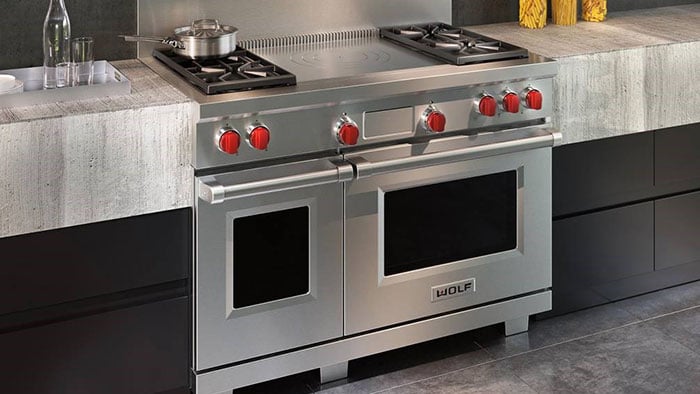
You have customization on the La Cornue and Lacanche but less on a pro range.
Wolf and BlueStar will offer grill, griddle, and French top combinations starting at 36 inches.
Other companies like Thermador have some features, including induction, but you can't fully choose like you can in a French range.
Output
.jpg?width=799&height=449&name=bluestar-burner-(1).jpg)
Pro ranges have more output, with BlueStar offering multiple 25,000 BTU burners, while most pro ranges offer multiple burners over 18,000 BTU.
French ranges, however, focus on style, customization, and a more traditional cooking experience.
Ovens
With La Cornue and Lacanche, you can have both electric and gas ovens for roasting and baking, while traditional pro ranges offer only one or the other.
However, brands like Thermador and Miele offer steam and speed ovens in their larger units.
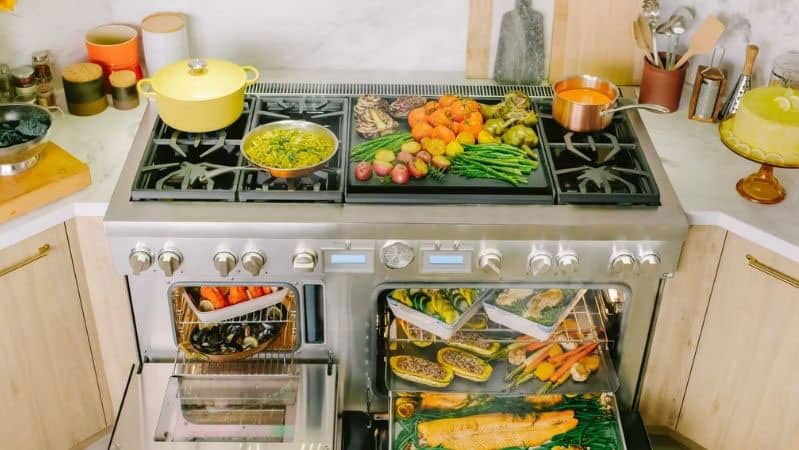
Pro ranges also offer self-cleaning ovens, a feature lacking in French ranges.
User Reviews
I don’t normally link to other sites, but these users have millions of followers and provide insight into the experience with CornuFé and Lacanche.
These reviews offer real-world insight into the pros and cons of using a French range.
- Lacanche Range Review by Julie Blanner
- French Range Review: La Cornue CornuFéby Chloe MacKintosh
Which French Range Should You Buy?
First off, these ranges are all different, but they’re a refreshing change from stainless steel with their rich color and trim options.
The La Cornue Château is the best overall, from customization to materials, and its arched ovens with natural convection give you top-notch cooking results.
CornuFé is a more affordable, French-inspired range, though it’s more Americanized with regular convection and standard ovens.
Lacanche is a great lower-priced option, especially with the larger units where you can save some serious cash.
That said, the ovens are a bit different. You’ll want to check their capabilities—especially broiling in the smaller sizes and ovens.
You’ll also have to rotate food in the Lacanche convection oven. And while finding a qualified service tech can be tricky, they do offer helpful online videos.
Before buying a unique appliance like a French range, make sure you’ve got the right support for delivery, installation, and service.
FAQs
Learn answers to the most common questions about French-style ranges.
Do They Have a Window?
No, they do not have a window. You open the door. The temperature will still stay constant as part of the design.
Most users are active cooks and would open the door and stick the knife in to determine doneness.
Also, you don't need a service call to clean the fog inside the windows.
Do They Have a Clock and Timer?
Although most French or professional ranges do not, some, like BlueStar and Viking, do.
You will adjust to not having a clock and timer, plus your phone can provide that feature.
Most ranges have smart functionality. La Cornue does not and probably won't.
Are the 110 Ovens Too Small?
The user reviews suggest otherwise. They appreciate the versatility of having two distinct ovens to cook different foods.
You can fit a 9" by 13" pan easily.
However, it cannot fit a 16-inch diameter pizza dish. Then again, most ranges can't either.
Do They Have Self Cleaning?
Neither brand offers self-cleaning. Many professional ranges also do not. BlueStar, Wolf all gas, Thermador Harmony all gas, and some Viking pro ranges do not have self-cleaning.
High-heat self-cleaning will, over time, compromise the inside of the oven liner.
Additional Resources
Get our free Pro Cooking Buying Guide with tips, trends, and reviews of all the best brands. Over 820,000 people have already found answers in a Yale guide.
Related Articles:
Why Should You Trust Us?
It seems that every appliance review has nothing but glowing comments about almost every product, yet you read customer reviews and they are almost universally bad.
We are here to fill in the disconnect. We'll give you the best features, and the drawbacks as well, including reliability based on over 37,000 calls performed by our service team just last year. Our goal is to give you ALL the information so you know what's right for you.
Please consider subscribing or adding to the conversation in the comments below. We appreciate you stopping by.
Steve Sheinkopf is the third-generation CEO of Yale Appliance and a lifelong Bostonian. He has over 38 years of experience in the appliance industry, and he is a trusted source of information for consumers on how to buy and repair appliances.
Steve has also been featured in numerous publications, including the
New York Times,
Consumer Reports,
The Boston Globe,
Bloomberg Radio, the
New York Post,
The Wall Street Journal, and
Entrepreneur, for his knowledge of how to buy appliances and appliance repair.
Steve is passionate about helping consumers find the best appliances for their needs, and he is always happy to answer questions and provide advice. He is a valuable resource for consumers who are looking for information on appliance buying, repair, and maintenance.
Despite being the worst goalie in history, Steve is a fan of the Bruins and college hockey, loves to read, and is a Peloton biker. The love of his life is his daughter, Sophie.
A Note About Pricing
Pricing on this blog is for reference only and may include time sensitive rebates. We make every attempt to provide accurate pricing at time of publishing. Please call the stores for most accurate price.
Topics:


